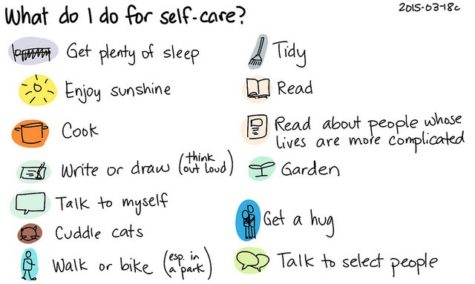 Photo Credit: Rafael Montilla
Photo Credit: Rafael Montilla When was the last time you took time to do something nice for yourself? If you’re like many people, you might find that you’ve been too busy to get a full night of sleep, to cook yourself a good meal, or to take time to relax. In other words, many of us may find that we don’t make enough time to practice self-care. However, self-care is an important way of maintaining our well-being and allowing us to be more resilient in the face of stress. Additionally, if you find yourself feeling worried by events in the news or the current political climate, self-care can be an important way to help cope with the distress or uncertainty you might feel. In today’s post, I’ll talk about what self-care is, why it’s important for well-being, and ways that you can incorporate self-care into your daily life.
What is self-care?
Self-care encompasses a wide variety of activities that people participate in as a way to improve well-being and cope with stress. Activities that can be considered self-care include things like exercise, eating well, taking time to relax, seeking out support from people close to us, and getting enough sleep. Self-care is important for managing stress and developing work-life balance.
Importantly, self-care can work as a preventative measure. Although you can start a self-care routine at any time, it’s recommended to come up with a self-care routine before you need it. So, for example, if you’re planning a life change (such as starting a new job or school), you may want to consider thinking of self-care strategies that you will use to help you manage stressors that might arise during this change. Self-care, essentially, serves to make us more resilient in the face of stress. As Sara Black McCullough writes, negative events are sometimes inevitable in life, but “self-care is a way to at least strengthen yourself, find some inner core so that you’re ready when life comes at you.”
Why is self-care important?
In some ways, self-care strategies can seem to involve common sense: eating well, taking time to recharge, and getting a good night’s sleep are things we all know we need. However, as Julie Beck writes for The Atlantic, we often forget to take care of ourselves when we’re busy or stressed. Often, we may feel pressure to put more hours in at work or school, potentially sacrificing work-life balance. This, Beck writes, is where self-care comes in: “There’s a growing acknowledgement of the fact that there’s little about modern society that prioritizes, encourages, or facilitates caring for yourself or treating yourself well…. And people are pushing back on that with space, with quiet, with careful, simple care.”
Research on self-care suggests that it can be an important way of maintaining our well-being. For example, one study found that engaging in self-care more often was related to higher well-being. Participants who made more time for self-care reported having better psychological health, being happier in their relationships, and feeling more hopeful. Additionally, seeing self-care as important was related to better well-being and this was accounted for by mindfulness. In other words, participants who valued self-care were more mindful, and mindfulness in turn was associated with higher levels of well-being.
When is self-care especially important?
Self-care is always an important habit to practice, but it can be particularly valuable when we’re under stress or when we’re hearing about negative events happening to others. Charles Figley, a professor of social work, writes that we can experience something called compassion fatigue: when hearing about others’ negative events, we can sometimes find this stressful and even start to experience burnout (which can make us less able to show compassion in future situations). This type of compassion fatigue can be especially common among psychotherapists and others who work in helping professions. Consequently, if you work in one of these professions, taking time for self-care is particularly important.
We can also experience this kind of compassion fatigue from reading about negative events in the news. Clinical psychologist Christine Meinecke suggests that, if we find that events in the news are having a negative effect on us, it can be important to stop reading the news for a bit and take some time to practice self-care. This can be especially important in our current political climate: although it’s important to stay informed, it’s also necessary to be mindful of how reading about these events affects us. In other words, we need to strike a balance between staying updated and taking time for self-care so that these events don’t overwhelm us. As Ann Douglas writes, “There’s a difference between being immersed and being informed.”

How can we incorporate self-care into our daily lives?
In one study, researchers conducted interviews with over 1,000 participants asking them about the types of self-care practices they used. The most common self-care activity reported by participants was exercise. Other common self-care activities listed by participants included getting social support from others, making time for fun activities (such as pursuing hobbies, reading, or watching a movie), and taking time to relax (for example, by spending time in nature). The researchers also looked at which self-care activities were related to well-being. They found that seeking out social support had the strongest link to well-being. Additionally, other self-care activities that were related to well-being included exercise, taking time to relax, and healthy habits such as eating well and getting enough sleep.
If you’re looking to make more time for self-care, there are a variety of ways that you can work to incorporate self-care into your schedule. Many of these activities are quite brief—taking just a few minutes—so even if you don’t feel like you have much free time, taking even just a short break from your daily to-do list can have benefits. Read on to learn some strategies for incorporating self-care into your schedule.
1.) Exercise. In addition to its benefits for physical health, exercise appears to be good for our brains as well. Exercise has been found to reduce anxiety, lower the risk of depression, and improve cognitive skills. Importantly, you don’t need to become a marathon runner to gain these benefits of exercise: even one brief exercise session can lead to short-term improvements in mood. In fact, recently, researchers developed a brief, 7-minute workout that was designed to help us get some of the benefits of exercise even when we don’t have time for a full workout.
2.) Get enough sleep. Sleep has been found to have a variety of benefits. When we don’t sleep well, we tend to have trouble remembering new information, are in a worse mood, and are less able to find creative ways of solving problems. If you’re having trouble getting enough sleep, click here to learn about strategies that can help you sleep better.
3.) Practice mindfulness. Research suggests that mindfulness can be an important way to practice self-care. In one study, psychology graduate students were taught about mindfulness and participated in a variety of activities designed to increase mindfulness (such as meditation and yoga) for 8 weeks. Compared to other students who did not practice these mindfulness activities, the mindfulness intervention reduced stress and anxiety and increased positive emotion. Participants who completed the mindfulness intervention also reported feeling more compassionate towards themselves. Research has also suggested that mindfulness can reduce depression and may even lead to beneficial changes in the brain. In other words, it appears that mindfulness can be an important self-care strategy that increases well-being. If you want to try out mindfulness for yourself, you might be surprised to learn that getting started with mindfulness is easier than you might think. Short mindfulness exercises can be incorporated into your daily routine, even if you only have a few minutes to spare. Additionally, mindfulness apps for your phone can be another way to incorporate mindfulness practice into your life.
4.) Practice self-kindness. Sometimes, we’re our own worst critics. It’s common for people to be compassionate and understanding to close friends, but not to extend this same level of compassion to themselves. The idea of self-kindness is to practice being gentle on ourselves when we experience setbacks, and to treat ourselves with the same kindness that we would extend to a close friend. If you’d like to try this out for yourself, you can find a short self-kindness activity here.
With our busy schedules, it can sometimes seem difficult to make time for self-care. Often we’re so busy that we may put others’ needs before our own, or we may forget to take time for ourselves. We know that self-care is important, but often we forget to listen to ourselves when we’re busy or under stress. However, research tells us that our intuition about self-care is right: taking time for ourselves is important for well-being and not doing so can put us at risk for fatigue and burnout. Although we may feel anxious about taking a break from work when our to-do lists feel long, taking time for self-care can actually make us more productive in the long run by preventing us from experiencing burnout.
Fortunately, if you’re looking to make time to practice self-care, it can actually be easier than you might think to incorporate it into your schedule. In particular, by exercising, getting enough sleep, practicing mindfulness, and treating ourselves with self-kindness, we can work to improve our health and well-being. In other words, although many of us may forget to take time for ourselves, it’s important to remember that you, like all people, are worth taking care of.
Additional Reading:
- School of Social Work, University at Buffalo. Introduction to self-care. https://socialwork.buffalo.edu/resources/self-care-starter-kit/introduction-to-self-care.html
- Beck, Julie (2015). The internet wants to help you take care of yourself. The Atlantic. http://www.theatlantic.com/health/archive/2015/10/internet-self-care/408580/
- Richards, K. C., Campenni, C. E., & Muse-Burke, J. L. (2010). Self-care and well-being in mental health professionals: The mediating effects of self-awareness and mindfulness. Journal of Mental Health Counseling, 32(3), 247-264.
- Figley, C. R. (2002). Compassion fatigue: Psychotherapists’ chronic lack of self care. Journal of clinical psychology, 58(11), 1433-1441.
- Meinecke, Christine (2010). Self-care in a toxic world. Psychology Today. https://www.psychologytoday.com/blog/everybody-marries-the-wrong-person/201006/self-care-in-toxic-world
- Ann Douglas (2017). How to Avoid Being Psychologically Destroyed By Your Newsfeed. http://www.anndouglas.net/blog/2017/1/30/how-to-avoid-being-psychologically-destroyed-by-your-newsfeed
- Shapiro, S. L., Brown, K. W., & Biegel, G. M. (2007). Teaching self-care to caregivers: effects of mindfulness-based stress reduction on the mental health of therapists in training. Training and Education in Professional Psychology, 1(2), 105-115.
- Hansson, A., Hillerås, P., & Forsell, Y. (2005). What Kind of Self-Care Strategies Do People Report Using and is There an Association with Well-Being?. Social Indicators Research, 73(1), 133-139.
- Neff, Kristin: Self-Compassion. http://self-compassion.org/the-three-elements-of-self-compassion-2/#3elements
About this Contributor: Elizabeth Hopper received her PhD in psychology from the University of California, Santa Barbara, where she conducted research on positive psychology and gratitude. Prior to attending UCSB, she received her BA in Psychology and Peace & Conflict Studies from UC Berkeley and worked in a research lab at UC San Francisco studying health psychology. Her research interests include gratitude, positive emotions, close relationships, and health. When she’s not writing about psychology, Elizabeth can often be found exploring the Bay Area and spending time with her dog, Luna.

Leave a reply
You must be logged in to post a comment.